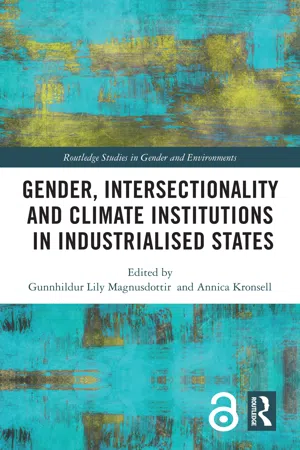
Gender, Intersectionality and Climate Institutions in Industrialised States
- 260 pages
- English
- ePUB (mobile friendly)
- Available on iOS & Android
Gender, Intersectionality and Climate Institutions in Industrialised States
About This Book
This book explores how climate institutions in industrialized countries work to further the recognition of social differences and integrate this understanding in climate policy making.
With contributions from a range of expert scholars in the field, this volume investigates policy-making in climate institutions from the perspective of power as it relates to gender. It also considers other intersecting social factors at different levels of governance, from the global to the local level and extending into climate-relevant sectors. The authors argue that a focus on climate institutions is important since they not only develop strategies and policies, they also (re)produce power relations, promote specific norms and values, and distribute resources. The chapters throughout draw on examples from various institutions including national ministries, transport and waste management authorities, and local authorities, as well as the European Union and the UNFCCC regime. Overall, this book demonstrates how feminist institutionalist theory and intersectionality approaches can contribute to an increased understanding of power relations and social differences in climate policy-making and in climate-relevant sectors in industrialized states. In doing so, it highlights the challenges of path dependencies, but also reveals opportunities for advancing gender equality, equity, and social justice.
Gender, Intersectionality and Climate Institutions in Industrialized States will be of great interest to students and scholars of climate politics, international relations, gender studies and policy studies.
The Open Access version of this book, available at https://doi.org/10.4324/9781003052821, has been made available under a Creative Commons Attribution-Non Commercial-No Derivatives 4.0 license.
Frequently asked questions
Information
Table of contents
- Cover
- Half-Title
- Series
- Title
- Copyright
- Contents
- List of figures
- List of tables
- About the contributors
- Acknowledgements
- 1 Gender, intersectionality and institutions
- PART 1 Intergovernmental and governmental climate institutions
- PART 2 Sectoral climate institutions
- PART 3 Local, community institutions, and climate practices
- Index